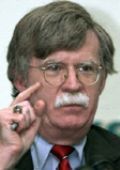US frustrations over Darfur
By WILLIAM M. REILLY
Oct 11, 2005 (UNITED NATIONS) — The U.N. Security Council has, again, condemned the latest upsurge in violence in Darfur, Sudan, but the United States says that is not enough and more should be done than just calling for the perpetrators to be brought to justice.
 Washington was so incensed about another briefing on a worsening situation it joined with the unlikely allies of Algeria, China and Russia in barring Juan Mendez, U.N. Secretary-General Kofi Annan’s special adviser on the prevention of genocide, from presenting his report to the council Tuesday.
Washington was so incensed about another briefing on a worsening situation it joined with the unlikely allies of Algeria, China and Russia in barring Juan Mendez, U.N. Secretary-General Kofi Annan’s special adviser on the prevention of genocide, from presenting his report to the council Tuesday.
The other nations’ reasons for blocking the presentation differed from those presented reporters by the United States.
The panel of 15-was briefed by Assistant Secretary-General for Peacekeeping Hedi Annabi, on the political, humanitarian and security situation in the troubled region
A written version of the Mendez report was presented to the council and he briefed reporters, essentially painting the same description as his report, that of a bad situation getting worse, including “an alarming gap” between Khartoum’s view and its measures to address the Darfur problems and with those of the people he spoke.
He cited “escalating banditry and attacks” against civilians, including attacks on internally displaced persons camps “Where reports of violence — particularly rape — are rife.”
The session came on the heels of a report from Annan’s Special Representative Jan Pronk for Sudan on the killing of three African (Union) Mission in Sudan personnel and two civilian drivers, employed by an AMIS contractor.
“We have jointly condemned and expressed concern in the face of the recent upsurge in violence” in Darfur, Ambassador Mihnea Motoc of Romania, the council president for October, told reporters following a closed-door session Monday.
“That was unacceptable in itself and all the more so in the context of and against the background of peace talks going on in Abuja on a political solution to the conflict in Darfur,” he said.
The AU soldiers were killed in the Khor Abeche area Saturday while protecting civilian workers.
The African Union holds the Sudanese Liberation Army responsible.
Additionally Pronk said dozens of AMIS personnel were kidnapped, most since released, in the Tine area of North Darfur, and a faction of the Justice and Equality Movement was blamed.
“This targeting of AU personnel contravenes the status of the African mission as an independent third-party, strongly supported by the U.N. Security Council,” said Pronk, who added the perpetrators would be held accountable along with those responsible for the general deterioration of the situation in Sudan’s western region of Darfur.
However, Pronk said in his statement, issued in Khartoum, SLA and JEM leaders denied their units were involved and blamed instead dissident units.
“The movements have to show that, in the areas which they claim to control, they take all action necessary to stop so-called split factions or dissident commanders, rather than seemingly allowing them to continue acting in violation” of early agreements, Pronk said.
The United States apparently was sympathetic to the reports from Pronk, Annabi and Perez, but wanted unspecified action, not more talk or statements from the council.
Before Moto delivered his remarks but after U.S. Ambassador John Bolton left the closed-door consultations and another Washington envoy took his chair, a U.S. official described to reporters outside the council’s chambers the Americans’ frustrations.
“We sat in here more than 25 minutes talking about process, who is going to sit in what chair and who was going to brief us when it’s a security situation in Sudan, deteriorating,” said the official, pointing with his thumb back to the chambers. “Yet you hear all around the table the statements that were made. These statements could have been written four months ago.
“No one was reacting to anything new,” he continued. “It was process, process, process. What does the council issue next? What kind of statement do we make, a press statement? Who is going to brief us? Why should we brief? Where should the person sit? When can we react to the briefing?”
The official recalled earlier frustrations in dealing with Sudan. That was when the word “sanctions” was barred and “measures” was found as a substitute.
China, which buys a great deal of Sudan’s oil and has considerable interests in the East Africa nation was regarded as behind that objection. Algeria was against sanctions in general and maintained it was a problem for the AU to solve. Russia supported both positions.
“There’s a growing frustration that the council has got to do more than just issue a press statement or a presidential statement on a security situation that is greatly deteriorating,” said the U.S. official, who asked not to be named. “We have to decide if we are going to actually get involved and do something or if we are going to sit around and issue another press statement and then go back and wash our hands for another four or five months.”
Some saw the Bolton move and the U.S. official’s explanation as part of Bolton’s “no nonsense” approach to the world organization.
(UPI)
